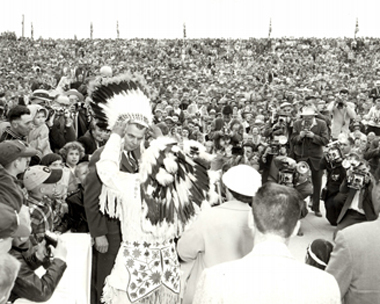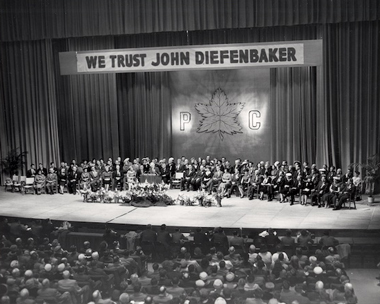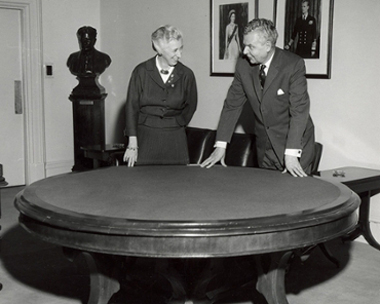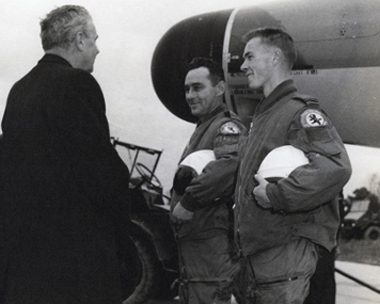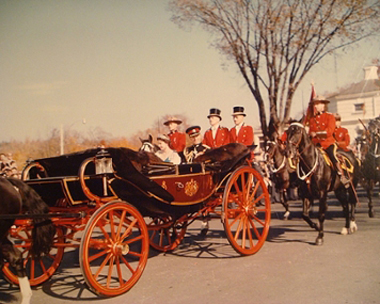The Life and Political Career of John G. Diefenbaker
"Parliament is more than procedure - it is the custodian of the nation's freedom."
- The Right Honourable John G. Diefenbaker, P.C.,
13th Prime Minister of Canada
The Right Honourable John G. Diefenbaker’s legacy is the dream of a united Canada, one which would find strength in its diversity. Regardless of whether he was in the House of Commons or a farmer’s field, Diefenbaker maintained his stance as being the voice of the “Average Canadian.” His perseverance in pursuing leadership in politics and his dedication to creating the Bill of Rights should inspire us all to work together to build a better Canada and to be active citizens.
John George Diefenbaker, Canada’s 13th prime minister from 1957-63, was born in Neustadt, Ontario on September 18, 1895, and later died on August 16, 1979 in Ottawa, Ontario.
An articulate speaker and supporter of civil rights, Diefenbaker was a passionate defense lawyer before he turned to his attention to politics. During his campaigns, Diefenbaker called for “One Canada”, a united country, coast to coast, where everyone no matter their religion, race, or region were all equal under one name as Canadians. As one of Canada’s longest running Members of Parliament, he held the highest percentage of seats won in the House of Commons. While in office, he championed the Canadian Bill of Rights, appointed the first female cabinet minister and Indigenous senator, welcomed the first Chinese-Canadian and Ukrainian-Canadian members of parliament, and extended the vote to First Nations people in Canada. He later turned his attention to the international community and took a stand against apartheid, a system of legislation that upheld segregationist policies against non-white citizens of South Africa.
View the online exhibits below to learn more about John G. Diefenbaker and the impact he had on Canada and the world.
Online Exhibits

Unity, Diversity, & Justice
(1867-present)
Canada’s approaches to human rights have developed from a long history of precedent-setting legislation and acts, but with these successes have come disappointments. View this online exhibit to learn more about how these experiences have shaped and informed Canadians’ attitudes toward unity, diversity and justice — at home and internationally.
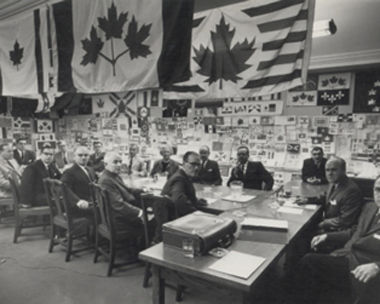
A Leaf of Their Own: Searching for a National Flag
(1871-1965)
The Maple Leaf flag has served as a distinctively Canadian symbol since February 15, 1965, when it was first raised on Parliament Hill. However, the search for a new national flag was marred in controversy. This online exhibit explores the social and political context of what became known as the Great Flag Debate.
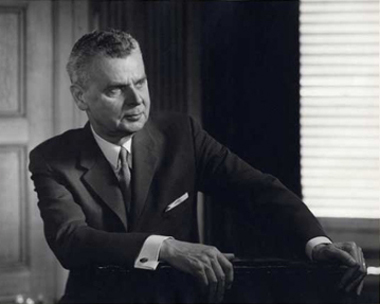
Fostering a Vision for Canada: The Diefenbaker Legacy
(1895 - 1979)
This online exhibit explores the life of John G. Diefenbaker starting from his birth in Neustadt, Ontario until his death on August 16, 1979. The exhibit moves through his life as a visionary, a lawyer, and a Prime Minister and delves into his One Canada dream, his relations with the USA, his devotion to the monarchy, his bond with the “average Canadian”, and the love he had for his relations with the USA, his devotion to the monarchy, his bond with the “average Canadian”, and the love he had for his family.
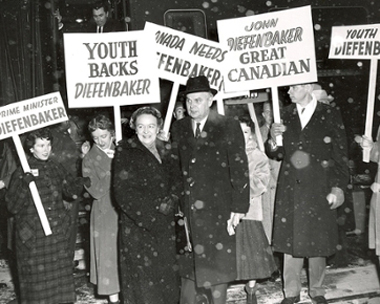
The Federal Elections of 1957 and 1958
(1957-1958)
The Liberals had been in power since 1935 and the Progressive Conservative Party of Canada, with newly-elected leader John G. Diefenbaker, was confident that they could make electoral inroads. View this online exhibit to learn more about the campaigning and elections that took place in 1957 and 1958.
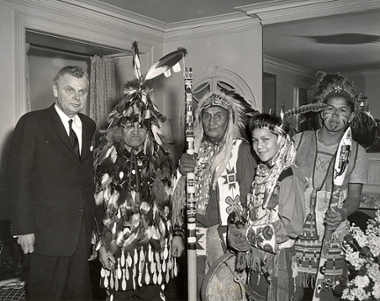
The Enfranchisement of Aboriginal Peoples of Canada
(1960)
A dedication to fairness and equality was a driving force of John Diefenbaker’s career. Diefenbaker felt that all citizens were entitled to certain essential rights, despite cultural differences. Throughout his political career he attempted to correct certain aspects of Canada’s past injustices, and his government took steps to create harmony between the Federal Government and First Nations peoples.
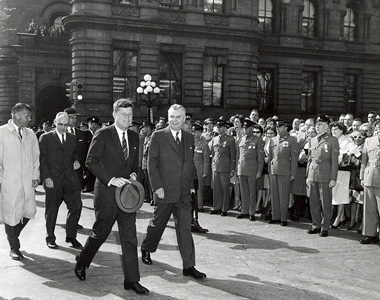
Canada's Role in the Cuban Missile Crisis
(1962)
Prime Minister Diefenbaker hesitated when President Kennedy told him to raise Canada’s military status to DEFCON 3, drawing a variety of responses from the public. View this exhibit to learn more about the relationship between John F. Kennedy and John G. Diefenbaker and Canada's response to the Cuban Missile Crisis.

